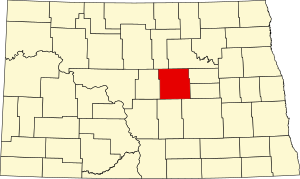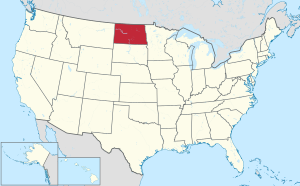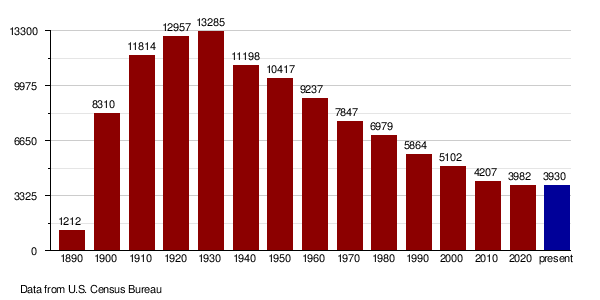Wells County is a county in the U.S. state of North Dakota. As of the 2020 census, the population was 3,982.[1] Its county seat is Fessenden.[2]
Wells County | |
|---|---|
 | |
 Location within the U.S. state of North Dakota | |
 North Dakota's location within the U.S. | |
| Coordinates: 47°35′N 99°40′W / 47.58°N 99.67°W | |
| Country | |
| State | |
| Founded | January 4, 1873 (created) August 28, 1884 (organized) |
| Named for | Edward Payson Wells |
| Seat | Fessenden |
| Largest city | Harvey |
| Area | |
• Total | 1,290 sq mi (3,300 km2) |
| • Land | 1,271 sq mi (3,290 km2) |
| • Water | 19 sq mi (50 km2) 1.5% |
| Population (2020) | |
• Total | 3,982 |
• Estimate (2022) | 3,930 |
| • Density | 3.1/sq mi (1.2/km2) |
| Time zone | UTC−6 (Central) |
| • Summer (DST) | UTC−5 (CDT) |
| Congressional district | At-large |
| Website | www |
History
editThe Dakota Territory legislature created the county on January 4, 1873. Its government was not organized at that time, nor was it attached for administrative or judicial purposes to another county. It was named Gingras County; this name continued until February 26, 1881, when the name was changed to Wells County, named for Edward Payson Wells, a Jamestown banker, early promoter of the James River Valley, and member of the legislature in 1881.
The county government was organized on August 28, 1884, with Sykeston as the county seat. In 1894 the county seat was transferred to Fessendon.[3] The county boundary was altered in 1883 when a parcel was transferred to Foster County, and again in 1885 when it received land from Foster County. Its boundary has remained unchanged since 1885.[4]
The center of population of North Dakota is located in the extreme southeastern corner of Wells County, about 9 miles (14 km) southeast of Sykeston.[5]
Geography
editThe James River flows east-northeasterly through Wells County. The county terrain consists of rolling hills with occasional protuberances, dotted with lakes and ponds in its SW portion.[6] The terrain slopes to the east and north; its highest point is a protuberance near the southwestern corner, at 2,182 ft (665 m) ASL.[7] Ihe county has a total area of 1,290 square miles (3,300 km2), of which 1,271 square miles (3,290 km2) is land and 19 square miles (49 km2) (1.5%) is water.[8]
Major highways
edit- U.S. Highway 52
- North Dakota Highway 3
- North Dakota Highway 15
- North Dakota Highway 30
- North Dakota Highway 91
- North Dakota Highway 200
- County 1[6]
- County 5
- Wells County Route 52
Adjacent counties
edit- Benson County - north
- Eddy County - east
- Foster County - east
- Stutsman County - southeast
- Kidder County - south
- Sheridan County - west
- Pierce County - northwest
Protected areas
editSource:[6]
- Karl T. Frederick State Game Management Area
- Upland State Game Refuge
Lakes
editSource:[6]
- Big Slough
- Crystal Lake
- Egg Lake
- Lake Ontario
- Silver Lake
- Sorenson Lake
Demographics
edit| Census | Pop. | Note | %± |
|---|---|---|---|
| 1890 | 1,212 | — | |
| 1900 | 8,310 | 585.6% | |
| 1910 | 11,814 | 42.2% | |
| 1920 | 12,957 | 9.7% | |
| 1930 | 13,285 | 2.5% | |
| 1940 | 11,198 | −15.7% | |
| 1950 | 10,417 | −7.0% | |
| 1960 | 9,237 | −11.3% | |
| 1970 | 7,847 | −15.0% | |
| 1980 | 6,979 | −11.1% | |
| 1990 | 5,864 | −16.0% | |
| 2000 | 5,102 | −13.0% | |
| 2010 | 4,207 | −17.5% | |
| 2020 | 3,982 | −5.3% | |
| 2022 (est.) | 3,930 | [9] | −1.3% |
| U.S. Decennial Census[10] 1790-1960[11] 1900-1990[12] 1990-2000[13] 2010-2020[1] | |||
2020 census
editAs of the census of 2020, there were 3,982 people.
2010 census
editAs of the census of 2010, there were 4,207 people, 1,943 households, and 1,223 families in the county. The population density was 3.31 people per square mile (1.28 people/km2). There were 2,481 housing units at an average density of 1.95 units per square mile (0.75/km2). The racial makeup of the county was 98.9% white, 0.3% American Indian, 0.1% black or African American, 0.1% Asian, 0.0% from other races, and 0.6% from two or more races. Those of Hispanic or Latino origin made up 0.5% of the population. In terms of ancestry, 65.9% were German, 25.9% were Norwegian, 6.7% were Irish, and 1.8% were American.
Of the 1,943 households, 19.7% had children under the age of 18 living with them, 54.1% were married couples living together, 5.6% had a female householder with no husband present, 37.1% were non-families, and 34.3% of all households were made up of individuals. The average household size was 2.10 and the average family size was 2.67. The median age was 51.5 years.
The median income for a household in the county was $40,136 and the median income for a family was $52,400. Males had a median income of $38,442 versus $25,597 for females. The per capita income for the county was $23,531. About 6.1% of families and 10.3% of the population were below the poverty line, including 12.5% of those under age 18 and 17.1% of those age 65 or over.
Population by decade
edit
Communities
editCities
editCensus-designated place
editUnincorporated communities
editTownships
edit- Berlin
- Bilodeau
- Bremen
- Bull Moose
- Cathay
- Chaseley
- Crystal Lake
- Delger
- Fairville
- Forward
- Fram
- Germantown
- Haaland
- Hamburg
- Hawksnest
- Heimdal
- Hillsdale
- Johnson
- Lynn
- Manfred
- Norway Lake
- Oshkosh
- Pony Gulch
- Progress
- Rusland
- Saint Anna
- Silver Lake
- South Cottonwood
- Speedwell
- Sykeston
- Valhalla
- Wells
- West Norway
- West Ontario
- Western
- Woodward
Politics
editWells County voters have been Republican-leaning for several decades. In no national election since 1964 has the county selected the Democratic Party candidate.
| Year | Republican | Democratic | Third party(ies) | |||
|---|---|---|---|---|---|---|
| No. | % | No. | % | No. | % | |
| 2024 | 1,815 | 80.56% | 405 | 17.98% | 33 | 1.46% |
| 2020 | 1,893 | 79.74% | 442 | 18.62% | 39 | 1.64% |
| 2016 | 1,796 | 75.37% | 419 | 17.58% | 168 | 7.05% |
| 2012 | 1,654 | 69.53% | 673 | 28.29% | 52 | 2.19% |
| 2008 | 1,468 | 61.76% | 841 | 35.38% | 68 | 2.86% |
| 2004 | 1,654 | 64.58% | 858 | 33.50% | 49 | 1.91% |
| 2000 | 1,610 | 66.80% | 661 | 27.43% | 139 | 5.77% |
| 1996 | 1,192 | 46.89% | 962 | 37.84% | 388 | 15.26% |
| 1992 | 1,171 | 40.16% | 888 | 30.45% | 857 | 29.39% |
| 1988 | 1,901 | 58.65% | 1,317 | 40.64% | 23 | 0.71% |
| 1984 | 2,426 | 69.20% | 1,036 | 29.55% | 44 | 1.25% |
| 1980 | 2,660 | 73.91% | 746 | 20.73% | 193 | 5.36% |
| 1976 | 1,941 | 51.53% | 1,742 | 46.24% | 84 | 2.23% |
| 1972 | 2,519 | 64.42% | 1,297 | 33.17% | 94 | 2.40% |
| 1968 | 2,266 | 59.92% | 1,265 | 33.45% | 251 | 6.64% |
| 1964 | 1,875 | 44.76% | 2,314 | 55.24% | 0 | 0.00% |
| 1960 | 2,641 | 58.24% | 1,885 | 41.57% | 9 | 0.20% |
| 1956 | 2,912 | 66.87% | 1,434 | 32.93% | 9 | 0.21% |
| 1952 | 3,709 | 77.89% | 1,016 | 21.34% | 37 | 0.78% |
| 1948 | 2,385 | 59.83% | 1,492 | 37.43% | 109 | 2.73% |
| 1944 | 2,529 | 61.59% | 1,557 | 37.92% | 20 | 0.49% |
| 1940 | 3,335 | 63.74% | 1,878 | 35.89% | 19 | 0.36% |
| 1936 | 1,263 | 23.84% | 3,114 | 58.78% | 921 | 17.38% |
| 1932 | 1,062 | 21.50% | 3,823 | 77.40% | 54 | 1.09% |
| 1928 | 2,364 | 52.39% | 2,123 | 47.05% | 25 | 0.55% |
| 1924 | 1,644 | 44.40% | 138 | 3.73% | 1,921 | 51.88% |
| 1920 | 3,202 | 85.71% | 456 | 12.21% | 78 | 2.09% |
| 1916 | 1,226 | 58.58% | 810 | 38.70% | 57 | 2.72% |
| 1912 | 356 | 23.58% | 494 | 32.72% | 660 | 43.71% |
| 1908 | 1,243 | 68.07% | 535 | 29.30% | 48 | 2.63% |
| 1904 | 1,330 | 80.90% | 209 | 12.71% | 105 | 6.39% |
| 1900 | 966 | 69.90% | 388 | 28.08% | 28 | 2.03% |
See also
editReferences
edit- ^ a b "State & County QuickFacts". United States Census Bureau. Retrieved April 6, 2023.
- ^ "Find a County". National Association of Counties. Retrieved June 7, 2011.
- ^ "County History". Official Portal for North Dakota State Government. Archived from the original on February 2, 2015. Retrieved May 4, 2011.
- ^ "Dakota Territory, South Dakota, and North Dakota: Individual County Chronologies". Dakota Territory Atlas of Historical County Boundaries. The Newberry Library. 2006. Archived from the original on April 2, 2018. Retrieved February 4, 2015.
- ^ "2010 Census Centers of Population by State". United States Census Bureau, Geography Division. Retrieved May 5, 2011.
- ^ a b c d e f "Wells County ND". Google Maps. Accessed February 21, 2019.
- ^ ""Find an Altitude/Wells County ND" Google Maps (accessed February 21, 2019)". Archived from the original on May 21, 2019. Retrieved February 21, 2019.
- ^ "2010 Census Gazetteer Files". United States Census Bureau. August 22, 2012. Archived from the original on January 29, 2015. Retrieved February 1, 2015.
- ^ "Annual Estimates of the Resident Population for Counties: April 1, 2020 to July 1, 2022". Census.gov. Retrieved April 6, 2023.
- ^ "U.S. Decennial Census". United States Census Bureau. Retrieved February 1, 2015.
- ^ "Historical Census Browser". University of Virginia Library. Retrieved February 1, 2015.
- ^ Forstall, Richard L., ed. (April 20, 1995). "Population of Counties by Decennial Census: 1900 to 1990". United States Census Bureau. Retrieved February 1, 2015.
- ^ "Census 2000 PHC-T-4. Ranking Tables for Counties: 1990 and 2000" (PDF). United States Census Bureau. April 2, 2001. Archived (PDF) from the original on March 27, 2010. Retrieved February 1, 2015.
- ^ "Ghosts of North Dakota". Archived from the original on August 28, 2008. Retrieved February 21, 2019.
- ^ Leip, David. "Atlas of US Presidential Elections". uselectionatlas.org. Retrieved April 13, 2018.
External links
edit- Wells County official website
- Northern portion of Wells County, North Dakota DOT
- Southern portion of Wells County, North Dakota DOT